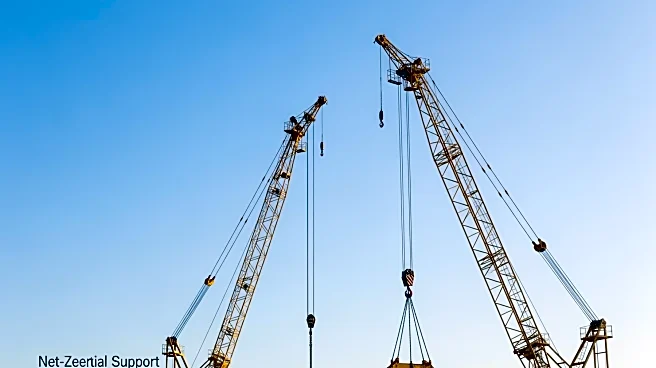What's Happening?
The European Commission has allocated €2.9 billion through its Innovation Fund to support 61 large-scale decarbonization projects across 18 countries. These projects span various sectors, including sustainable
fuels, green hydrogen, and recycling. A significant portion of these initiatives will require heavy-lift and project cargo services, indicating a steady demand for industrial transport in Europe. Notable projects include retrofitting cement plants with carbon-capture technology in France and Belgium, integrating full carbon capture and storage chains in Italy and France, and creating a shared capture and storage network in Romania. Additionally, Greece will build a CO2-liquefaction export terminal and offshore unit, necessitating the movement of large industrial modules, compressors, and pipelines.
Why It's Important?
The funding from the European Commission underscores a strong commitment to decarbonization, as evidenced by the overwhelming number of applications received, which requested a total of €21.7 billion—far exceeding the available budget. This initiative is crucial for advancing Europe's transition to a net-zero economy, promoting sustainable industrial practices, and fostering innovation in renewable energy technologies. The projects will not only contribute to reducing carbon emissions but also stimulate economic growth by creating demand for specialized logistics and transport services. This could lead to increased employment opportunities in the heavy-lift and project cargo sectors, as well as advancements in green technology manufacturing.
What's Next?
As these projects progress, there will likely be increased collaboration between governments, industries, and logistics providers to ensure the successful implementation of decarbonization technologies. The demand for heavy-lift services is expected to rise, prompting companies in the logistics sector to expand their capabilities and invest in new technologies to meet the needs of these large-scale projects. Additionally, the success of these initiatives could encourage further investment in similar projects, both within Europe and globally, as countries strive to meet their climate goals and transition to sustainable energy sources.
Beyond the Headlines
The European Commission's funding initiative highlights the ethical and environmental responsibility of transitioning to a low-carbon economy. It reflects a broader cultural shift towards sustainability and the importance of international cooperation in addressing climate change. The projects could set a precedent for other regions to follow, demonstrating the feasibility and benefits of large-scale decarbonization efforts. Moreover, the focus on carbon capture and storage technologies may lead to advancements in these fields, potentially reducing costs and increasing efficiency, which could accelerate global adoption.










